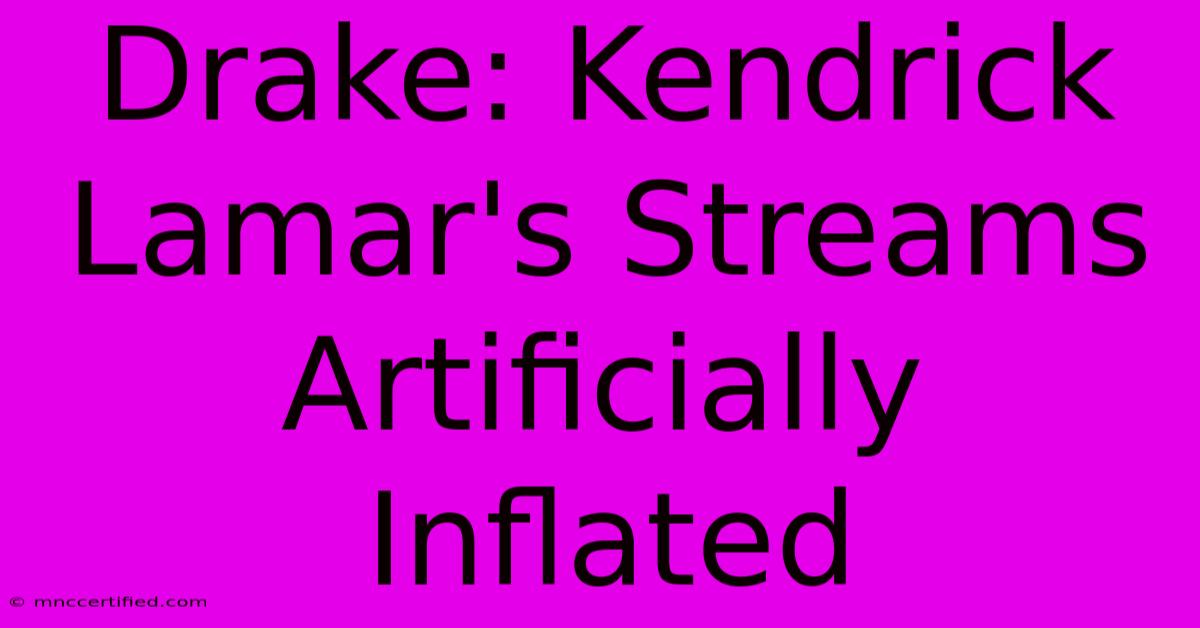Drake: Kendrick Lamar's Streams Artificially Inflated

Table of Contents
Drake: Kendrick Lamar's Streams Artificially Inflated? Unpacking the Controversy
The music industry is a complex ecosystem, and streaming numbers, while often seen as the ultimate metric of success, are not always a clear reflection of genuine popularity. Recent discussions have centered around allegations that Kendrick Lamar's streaming numbers might be artificially inflated, a claim that has sparked considerable debate, particularly in comparison to Drake's seemingly more organically accrued streams. This article delves into the complexities of music streaming data, exploring the possibility of manipulation and examining the arguments surrounding Kendrick Lamar's impressive numbers.
The Streaming Numbers Game: Why it's Not Always Black and White
Before diving into the specific claims regarding Kendrick Lamar, it's crucial to understand the inherent challenges in interpreting streaming data. Millions of streams are generated daily across various platforms, making it difficult to verify the authenticity of every single play. Several factors can influence streaming numbers, including:
- Playlist Inclusion: Placement on popular playlists, especially those curated by Spotify or Apple Music, can significantly boost an artist's streams. This isn't necessarily manipulation, but it highlights the importance of algorithmic influence.
- Promotional Campaigns: Targeted advertising and promotional campaigns, often involving social media blitzes and paid partnerships, can artificially inflate numbers in the short term.
- Geographic Variations: Streaming habits vary widely across different countries and regions. An artist might experience a surge in streams from a specific region due to cultural trends or marketing efforts focused on that area.
- Bot Activity: The most contentious point is the possibility of bots and automated systems generating fake streams. This practice is illegal and unethical, but unfortunately, it's a persistent challenge in the industry.
Drake vs. Kendrick: A Comparison of Streaming Success
Drake consistently ranks among the top-streamed artists globally. His massive fanbase, coupled with years of consistent releases and savvy marketing, contribute to his remarkable numbers. These numbers, while substantial, are often held up as a benchmark of organic growth.
The comparison to Kendrick Lamar, who also boasts incredibly high streaming numbers, fuels the controversy. Some argue that Lamar's ascent to the top of the streaming charts is too rapid, suggesting the potential involvement of artificial inflation techniques. However, it's important to note that Lamar's critically acclaimed albums and powerful performances undoubtedly contribute significantly to his impressive streaming figures.
Evidence and Arguments: Is There Proof of Manipulation?
The claims regarding Kendrick Lamar's streams are largely speculative, lacking concrete, verifiable evidence of widespread manipulation. While anecdotal evidence and some inconsistent data points may raise concerns, they do not constitute definitive proof. The complexities of analyzing global streaming data make pinpointing instances of artificial inflation extremely challenging.
Many experts caution against jumping to conclusions based on incomplete information. Attributing unusually high streaming numbers solely to artificial inflation ignores other factors that can legitimately contribute to an artist's success.
The Importance of Transparency and Accountability
The debate surrounding artificially inflated streams underscores the need for greater transparency and accountability within the music industry. Streaming platforms have a responsibility to implement robust systems to detect and prevent bot activity. Furthermore, artists and their labels should prioritize ethical promotion practices, avoiding strategies that artificially manipulate streaming numbers.
Conclusion: Navigating the Murky Waters of Streaming Data
The discussion surrounding Drake and Kendrick Lamar's streaming numbers highlights the complex relationship between online metrics and true artistic merit. While concerns about stream manipulation are valid, accusations should be supported by credible evidence. The focus should shift towards promoting ethical practices within the industry and demanding greater transparency from streaming platforms to ensure fair and accurate representation of artist success. Ultimately, the true measure of an artist's success lies in their lasting impact and cultural influence, not just their fleeting position on streaming charts.

Thank you for visiting our website wich cover about Drake: Kendrick Lamar's Streams Artificially Inflated. We hope the information provided has been useful to you. Feel free to contact us if you have any questions or need further assistance. See you next time and dont miss to bookmark.
Featured Posts
-
Jiaozuo Taoding Trading Co Ltd
Nov 26, 2024
-
Proof Of Car Insurance Template
Nov 26, 2024
-
Drakes Spotify Umg Stream Dispute
Nov 26, 2024
-
Dental Bonding Black Triangles
Nov 26, 2024
-
Areola To Start For West Ham Lopetegui Hints
Nov 26, 2024